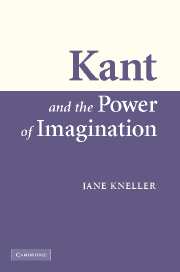Book contents
- Frontmatter
- Contents
- Preface and acknowledgments
- Introduction
- 1 Kant and Romanticism
- 2 The power of imaginative freedom
- 3 The interests of disinterest
- 4 Aesthetic reflection and the primacy of the practical
- 5 The failure of Kant's imagination
- 6 Imaginative reflections of the self in Novalis and Hölderlin
- 7 Novalis' Kantianism and Kant's Romanticism
- Bibliography
- Index
3 - The interests of disinterest
Published online by Cambridge University Press: 22 September 2009
- Frontmatter
- Contents
- Preface and acknowledgments
- Introduction
- 1 Kant and Romanticism
- 2 The power of imaginative freedom
- 3 The interests of disinterest
- 4 Aesthetic reflection and the primacy of the practical
- 5 The failure of Kant's imagination
- 6 Imaginative reflections of the self in Novalis and Hölderlin
- 7 Novalis' Kantianism and Kant's Romanticism
- Bibliography
- Index
Summary
Kant's deduction of our “peculiar ability” (sonderbares Vermögen, V: 281) to make universally valid judgments about particulars without the aid of concepts and based solely on a feeling is as well known as his “deduction of judgments of taste” in the Critique of Judgment. Less familiar is his contention that this aesthetic reflective capacity involves certain demands on how we value the world around us. Having just presented his deduction, Kant claims that we can more readily understand the judgment of taste's demand for agreement if we see that the mere “universal communicability as such of our feeling must already carry with it an interest for us” (V: 296). That is, judgments of taste make demands on us analogous to the demands of morality, because, like moral interest in the good, aesthetic interests are bound up with a kind of duty. However, these interests of disinterest are more important to Kant than just as vehicles for explaining why taste can command the assent of everyone, and they clearly have implications beyond the justification of judgments of taste. In what follows, I want to suggest that Kant's discussion of the interests of disinterest has significance for his views on art and morality, as well as for his position on how we ought to value nature.
MORAL INTEREST AND INTELLECTUAL INTEREST IN THE BEAUTIFUL
Before looking at the broader implications of his views, it is necessary to discuss briefly Kant's doctrine of “interest” and also to look closely at his arguments in Sections 41 and 42 to the effect that beauty gives rise to interests in us.
- Type
- Chapter
- Information
- Kant and the Power of Imagination , pp. 60 - 71Publisher: Cambridge University PressPrint publication year: 2007

